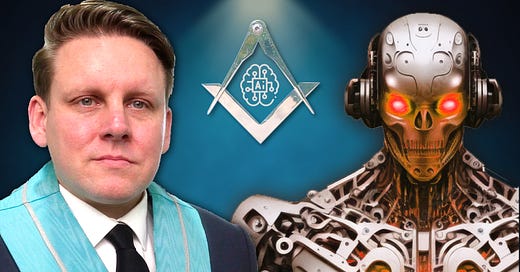Have you ever wondered how Freemasonry should respond to the rapid advancements in AI and the push for open science? As a Mason, you might be asking yourself if our ancient craft should take a direct role in guiding these developments.
Let me explain why this question isn't as straightforward as it might seem, and why our true power lies not in institutional action, but in shaping ethically-minded individuals.
First, you might be thinking about Freemasonry's historical connections to scientific progress. After all, many members of the Royal Society were Freemasons, and we can't forget about Brother Benjamin Franklin's famous experiments with electricity.
But here's the thing - these scientific endeavors weren't carried out as Masonic activities. They were the independent work of Masons who happened to be scientists.
This is a crucial distinction that's often misunderstood.
Now, let's get to the heart of the matter. Freemasonry isn't a scientific institution or a tech think tank. Our focus has always been on the moral and spiritual development of our members. That's our core purpose, our raison d'être if you will.
Think about it - our entire system is built around moral education. The square and compasses, our most recognizable symbols, teach us about moral rectitude and self-control. Our degree ceremonies guide us through a process of self-reflection and moral instruction. Each degree builds upon the last, presenting moral lessons in an increasingly complex manner.
This focus on individual moral and intellectual development has remained consistent throughout our history. Whether in the age of enlightenment or our current digital era, Freemasonry's core purpose has been to "make good men better" (even though I much despise this phrase).
So, how does this relate to AI and open science? Well, our impact on these fields comes through the actions of our individual members. Imagine a Brother working as a data scientist at a major tech company. When faced with decisions about using customer data in a new AI model, he might draw upon our Masonic teachings about integrity and respect for others. This could lead to more privacy-conscious AI development, potentially influencing company policy and industry standards.
Or consider a Masonic scientist advocating for open access to scientific publications, inspired by our ideals of enlightenment and the pursuit of truth. This could contribute to making valuable research findings more widely available, accelerating scientific progress and democratizing knowledge.
These examples illustrate how Masonic principles, internalized by individual members, can guide ethical decision-making in various professional contexts. One ethically-minded AI developer might influence an entire team or company. A scientist championing open access could inspire colleagues to make their research more freely available.
Remember, while an organization's public stance can be ignored or resisted, the consistent ethical behavior of individuals can gradually shape the culture of entire industries. It's not a top-down directive, but a lived ethical framework that informs daily decisions and interactions.
As technology evolves at an unprecedented pace, with new AI models and blockchain applications emerging almost daily, our approach to moral education remains remarkably stable. This consistency makes Freemasonry incredibly valuable in these rapidly changing times.
By focusing on enduring principles rather than specific technologies, we equip our members to navigate a wide range of ethical challenges. A Brother trained to consider the moral implications of his actions is well-prepared to tackle the ethical dilemmas posed by emerging technologies, even if those exact technologies weren't explicitly discussed in the lodge.
This approach of shaping adaptable individuals rather than directly involving ourselves in organizations allows Freemasonry to maintain its relevance across different eras and technological paradigms. While a policy focused on a specific technology might quickly become obsolete, ethical reasoning skills remain applicable as technology evolves.
In a world where technological advancement often outpaces ethical consideration, individuals grounded in strong moral principles are more crucial than ever. Our commitment to fostering such individuals positions Freemasonry as a valuable contributor to society's ethical framework, even if our influence isn't always immediately apparent.
So, as we consider Freemasonry's role in the age of AI and open science, let's remember that our greatest impact comes not from direct institutional action, but from our unwavering commitment to shaping ethically-minded individuals.
By staying true to our core purpose of moral education, we equip our members to navigate the complex ethical landscapes of emerging technologies and scientific advancements.
This time-tested approach continues to mold individuals who can positively influence their professions and communities, ensuring our relevant and profound impact on society endures. After all, isn't that what Freemasonry is truly about?




